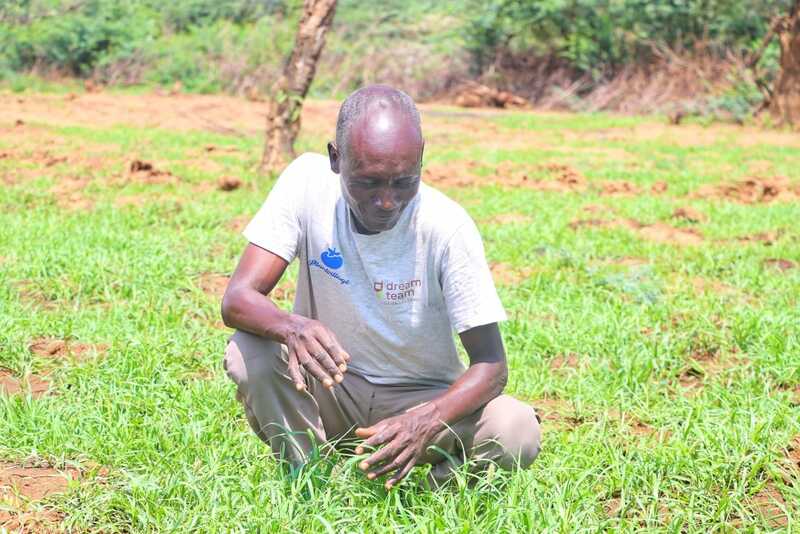From Invasive Nuisance to Fertile Grounds: PlantVillage's Land Rejuvenation Journey in Marigat, Baringo County
Posted on
The PlantVillage team in Baringo County, Kenya, is empowering locals to combat the invasive Prosopis juliflora and converting it into valuable biochar. This eco-friendly biochar is now enriching the soil, enabling the cultivation of nutrient-rich grass for livestock feed and sale.

In the heart of Marigat, a rural community in Baringo County, a tale of transformation is unfolding. For years, the once-vibrant lands have struggled under the weight of an invasive plant - Prosopis juliflora. Its relentless spread has posed a persistent threat to local agriculture, livelihoods, and the environment.
The relentless invasion of Prosopis juliflora has been a serious issue for the community. With its fast growth rate and hardy nature, it swiftly colonizes vast stretches of land, choking native flora and degrading soil quality. Local farmers face an uphill battle in trying to control its spread.Traditional methods of removal often prove futile, leaving the land in a state of despair. The community has been in dire need of a solution to reclaim their lands and restore their livelihoods.

Vast Lands Overrun by Invasive Prosopis Juliflora
One of the residents, Samuel Montorosi, says that the shrub has deep roots that invade farms, making it hard for locals to practice agriculture. The plant also invades grazing fields, suppressing pasture germination and diverting river courses. Both residents and livestock get pricked by its thorns, while its sugary pods are killing livestock. The spines of the plant have a toxin that damages both the gums and hooves of their animals.
PlantVillage, recognizing the pressing need in Marigat, has partnered with local farmers in the Salabani community to initiate a land rejuvenation project. The key innovation is converting the invasive Prosopis juliflora into biochar - a technique that is revitalizing both the land and the community.
The transformation begins with the arduous task of removing the invasive plants. Led by John Mayieka, the biochar project lead at PlantVillage, and his team, PlantVillage engages local farmers in collective efforts to clear the land. This collaborative approach not only accelerates the process but also fosters a sense of ownership among the community members, igniting a spirit of active participation. The cleared Prosopis juliflora, once a menace, is then transformed into biochar - a highly porous, carbon-rich substance obtained by heating biomass in an oxygen-limited environment. This biochar, rich in nutrients and beneficial microorganisms, holds the key to rejuvenating the soil.

PlantVillage teams up with locals to transform cut Prosopis juliflora into biochar
The process comes full circle as the biochar is incorporated into the soil, addressing one of agriculture's most pressing challenges: soil degradation. The biochar serves as a soil amender, enhancing its structure, water-holding capacity, and nutrient retention. This means that not only can the land support healthy plant growth once again, but it also ensures the long-term fertility of the soil. This approach is a game-changer.
"My farm was once plagued by an invasive plant that seemed unbeatable. But with the incredible support of PlantVillage, we not only cleared it out but transformed it into valuable biochar. Now, my fields boast vibrant green grass that brings a smile to my face every day. I'm excited to provide nourishing feed for my livestock and even share the surplus with our community. PlantVillage, you've truly made a difference, thank you!" - Simon Kitol, a farmer in Marigat, Baringo County.

Farmer Simon Kitol tending to his flourishing grassland, a testament to his efforts in conquering the invasive Prosopis juliflora
Simon Kitol's farm now stands as a testament to this transformation. Once overwhelmed by invasive plants, his land is now a lush expanse of nutrient-rich grass. This grass, cultivated with the help of biochar-enriched soil, serves a dual purpose: providing nourishing livestock feed and creating an additional source of income through the sale to the community. As Simon tends to his thriving grass and surveys the verdant landscape, his satisfaction is palpable.
“Beyond the immediate benefits to the community, the adoption of biochar holds profound implications for sustainable agriculture and environmental conservation. Biochar not only restores degraded lands but also contributes to carbon sequestration, mitigating the impact of climate change. By enhancing soil health and increasing crop productivity, it offers a path towards food security and resilience in the face of changing environmental conditions,” says John Mayieka, the biochar project lead at PlantVillage.

once-invasive Prosopis juliflora-infested land, now thriving with lush green grass
The story of Simon Kitol and his journey from battling an invasive menace to reaping the rewards of sustainable land rejuvenation is a tale of hope and resilience. Through the collaboration between local farmers and PlantVillage, the community is not only reclaiming their land but also pioneering a new approach to agriculture that benefits both people and the planet. The conversion of Prosopis juliflora into biochar stands as a beacon of innovation, showcasing the potential of sustainable solutions in tackling complex challenges in Arid and Semi-Arid Lands.